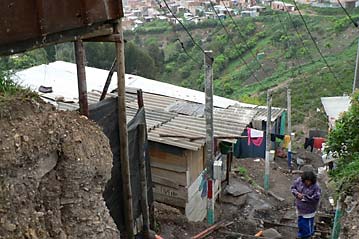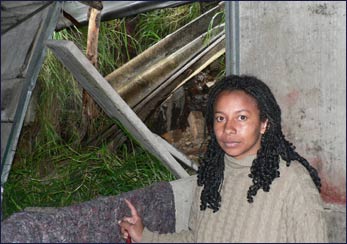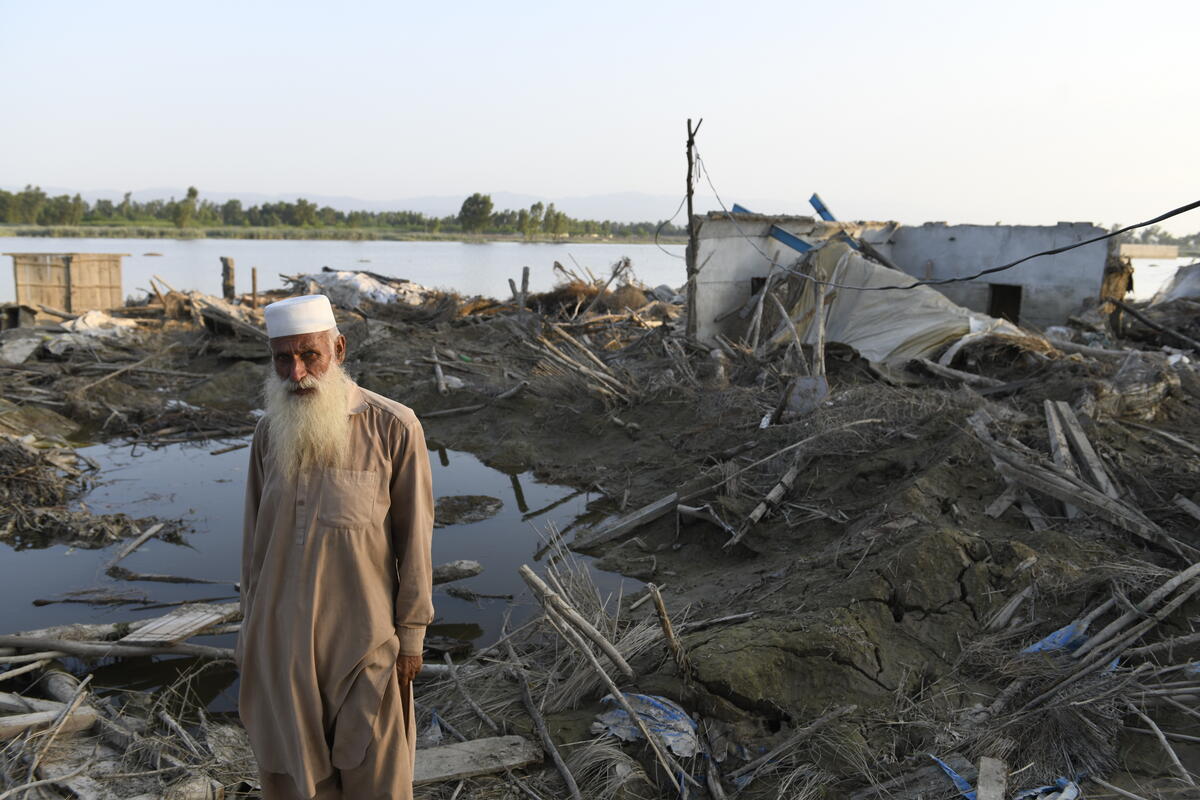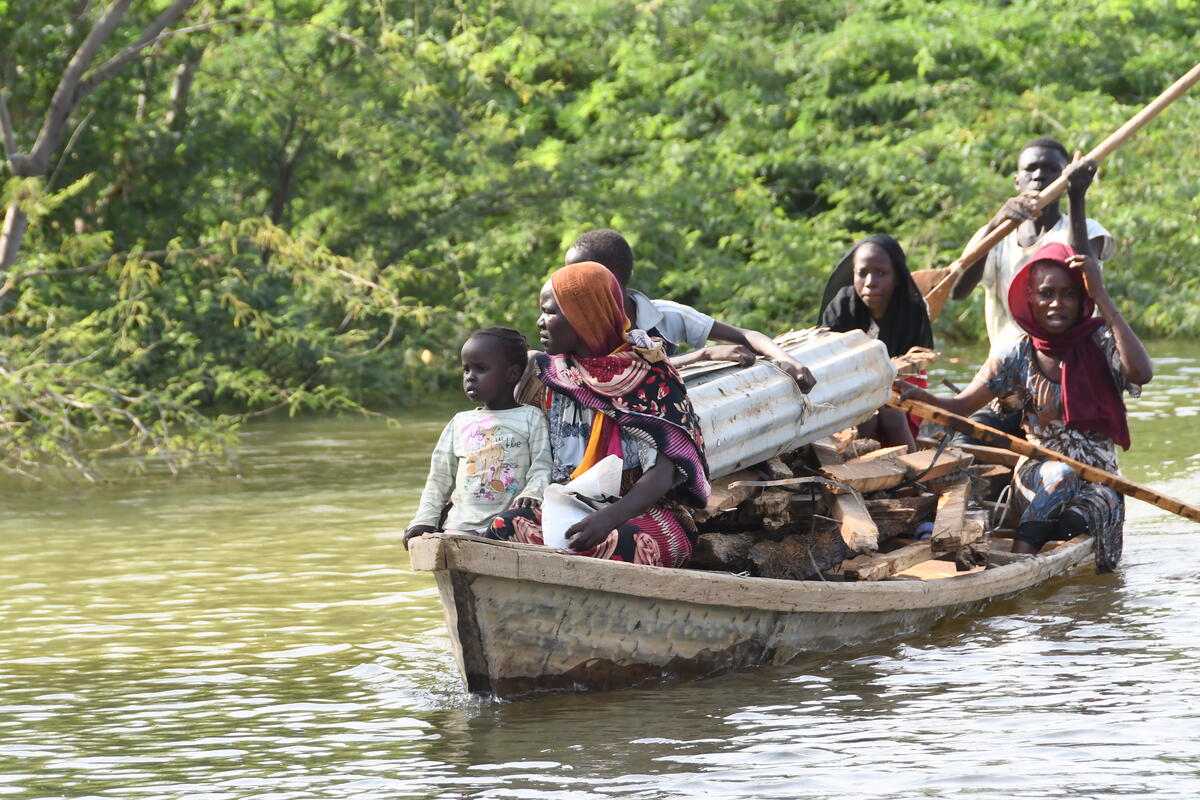Flooding threatens Colombia's displaced with further upheaval
Flooding threatens Colombia's displaced with further upheaval

ALTOS DE CAZUCÁ, Colombia, May 29 (UNHCR) - Five years after she first arrived in Altos de Cazucá, a poor neighbourhood on the outskirts of the Colombia's capital Bogota, Denise is once again homeless. Her small house, precariously built on a steep incline in the foothills of the Andes, was almost washed away ten days ago when water from the mountain tops came gushing through the back wall.
Fearing a landslide, the entire neighbourhood took refuge in a small church where some four hundred people slept for three nights. But, that became too crowded and Denise and her neighbours, too scared to go back to their homes, had to move into rented accommodation they can ill afford. After two dry days, the rain started again, as hard as ever, and it only takes one look at their flimsy houses to realise the danger.
For the past few weeks, heavy rains have battered many parts of Colombia. Country-wide people have had to leave their homes as rivers overflow and landslides sweep away everything in their path. The most vulnerable are people living in the poorest areas, in makeshift houses often built on unsafe land - areas where many displaced families are forced to live.
"Displaced people often end up on the outskirts of big cities, building very basic shelters wherever they can," said Roberto Meier, UNHCR's representative in Colombia. "In most cases, the only land they can find is in unsafe locations right on the banks of a river, for example, or in places with frequent landslides. Whenever there are heavy rains, they are the first ones to lose their homes yet again."
UNHCR is working with local authorities in areas around Bogota where there are displaced people, to help coordinate the emergency response to the flooding and find alternative accommodation.
When Denise and her four small children arrived in Altos de Cazucá five years ago, they built their home on a rubbish dump on wasteland at the far end of the sprawling shantytown. She used strong rubbish bags, old bits of plastic and some zinc that a kind neighbour gave her to build what was then no more than a shack.
"It was not much but it was better than sleeping on the streets with the children," Denise said. "Looking back, I do not know how I found the strength to carry on. Everything I did then, I did for the sake of the children. In any case, there was no choice, I knew I could not go back home."
Denise, whose mother and brother had been kidnapped by members of an irregular armed group, fled her hometown after the same armed group gave her one day to leave the region. That same evening she got on a bus for the four-hour ride to Bogota, where she did not know a single soul. The most traumatic part of this awful experience was being forced to sleep on the streets with her small children - the youngest only a few months old.
"I never once had imagined it would ever come to this," she says. "The worst was that nobody tried to help. Because we were on the streets everyone looked at us as if we were thieves or beggars. All the time, I was worried about what was going on back home, how I would feed the children. It's only when I arrived in Altos de Cazucá that I got help from other displaced people."
Altos de Cazucá at that time was no more than a shantytown, where thousands of displaced people like Denise joined other destitute people in trying to scrape together a living. There were no basic services, no water or electricity and no state presence. The area was ruled by armed gangs that imposed their own version of rough justice.
UNHCR started working in Altos de Cazucá in 2004, and provided the impetus for the opening in early 2005 of a UN office giving legal aid and other assistance to the local population. A few months later, the government followed suit with the opening of a "House of Rights". The people of the neighbourhood now have access to some medical services, legal aid and psycho-social advice, as well as some job-training.
"The idea was to regain some of the space that, through the absence of state institutions, had been lost to various criminal elements and irregular armed groups," says Meier. "People now are getting used to the idea that they can turn to the state for help, even if this latest disaster shows us that a lot remains to be done not only in terms of safe housing but also in the area of emergency response."

Just like the neighbourhood, Denise's house had improved over the past few years. Most of the outside walls are now made of bricks and she built an extra room at the back. It was never much, but little by little it had become a home. Back home briefly to examine the damage, Denise looked out in anguish another torrential downpour started to pound down on the tin roof.
"We had better to go, it is not safe here," she said, urging everyone out of the house. "We'll have to wait until the bad weather ends to start repairing the house. And who knows, God willing, next winter will not be so bad."
By Marie-Hélène Verney in Bogota, Colombia








